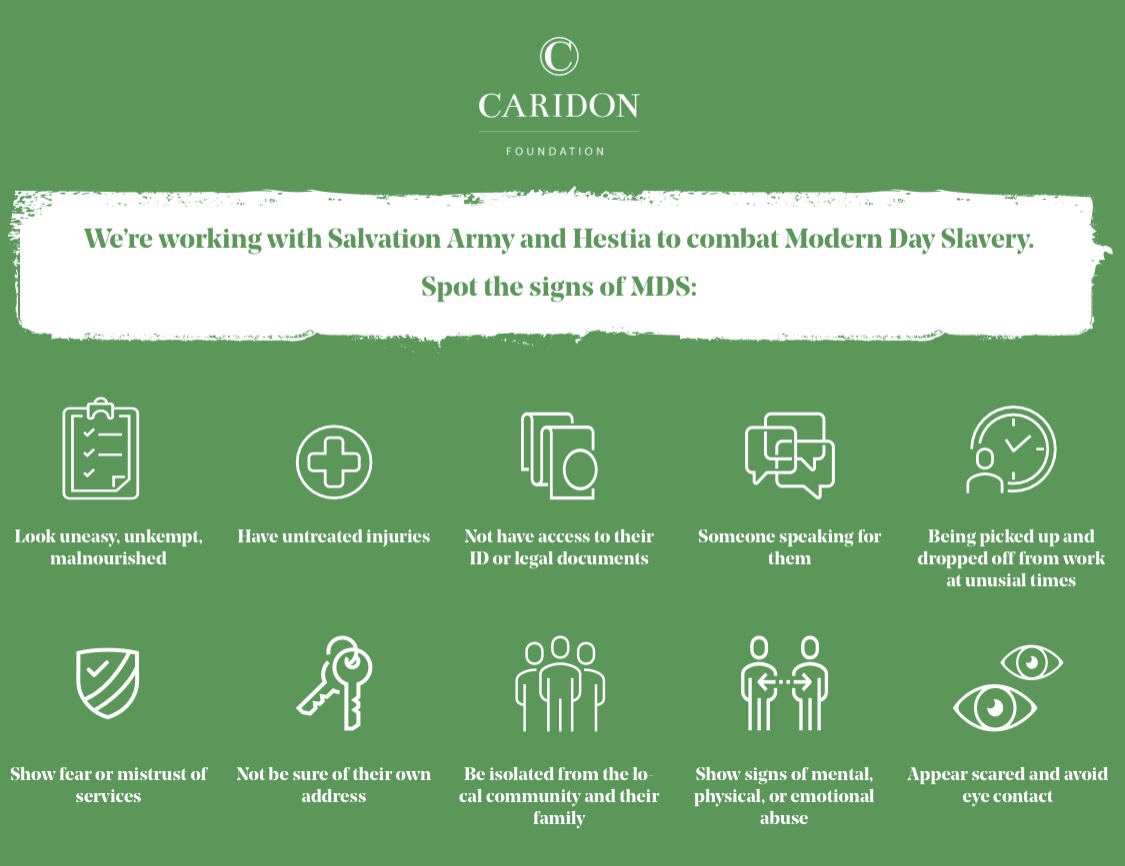The Caridon Foundation partners with Salvation Army and Hestia to combat Modern Day Slavery
The Caridon Foundation, part of the Caridon Group, has joined forces with Salvation Army and Hestia to combat Modern Day Slavery (MDS) and has begun working with a survivor. The Caridon Foundation is passionate about raising awareness of MDS and how people’s lives are impacted. It welcomes partnerships such as this to help support victims and combat issues such as these.

Despite slavery being officially abolished centuries ago, thousands of people are still being exploited and sold as slaves across the UK. They can be forced to work in the sex trade, used as domestic slaves, exploited for labour or criminal activity, have their organs removed to be sold or human trafficked. The impact can be devastating for the victims. The Salvation Army provides specialist support of adult victims of modern slavery in England and Wales.
In October 2017, Ministers announced a package of Reforms to the National Referral Mechanism (NRM) – the system for identifying and supporting victims of Modern Day Slavery. Croydon council was one of just six local authorities selected to take part in a pilot, led by the Salvation Army, to test how best to support victims into local communities while reducing the risk of further exploitation, becoming homeless or re-trafficked.
London Borough of Croydon together with Hestia work with survivors for 20 weeks – support is based on the principles of trauma-informed practice and focuses on developing resilience, with help around accessing legal, health, and financial advice as well as support to establish meaningful social activities and healthy relationships.
An essential part of the support package for clients is stable housing which is where the Caridon Foundation comes in. The not for profit was set up by the Caridon Group to support vulnerable people and help them with social housing and supported accommodation, applying for benefits, training and employment, education, health assessments, and welfare. They also engage with tenants and provide welfare checks, counselling sessions, and workshops on topics such as healthy eating, budgeting, CV building, confidence building, and self-esteem. There are also initiatives such as the Caridon Foundation’s football team.
The Caridon Foundation welcomed its first Modern Day Slavery survivor onto its service in June and due to Croydon having the highest rate of slavery in London, around 100 survivors are expected to be helped by the Caridon Foundation, Salvation Army, and Hestia.
Mario Carrozzo, CEO of the Caridon Group, said: “We feel honoured to be given the opportunity to work with the Salvation Army and Hestia to help survivors learn from their experiences and offer our support. We are immensely excited about being chosen as the ‘preferred’ provider for this client group.”
Survivors of MDS often have difficulty accessing housing leaving them vulnerable to falling back into becoming a victim. There is no-long term plan from Government organisations to support survivors with housing and many victims have to move out of their safe house before they have fully recovered from abuse and put their lives back on track.
As some survivors were homeless prior to becoming a victim of MDS, they do not have a home to go back to. The Modern Slavery Helpline set up a dedicated hotline called Unseen in October 2016 and reported last month that homeless people were involved in 276 reported cases.
Homeless services are busy front-line services with many people having to wait before they are helped, leaving them vulnerable. Those that escape may be left destitute without ID documents which makes starting a new life very difficult.
Many people who escape from slavery find themselves homeless. The study reported that more than 350 of the potential victims in cases reported to the hotline between October 2016 and April 2019 were homeless either before, during or after they escaped captivity.
The Caridon Foundation is supporting survivors with access to housing and ensuring they have a safe place to live and can rebuild their lives.
